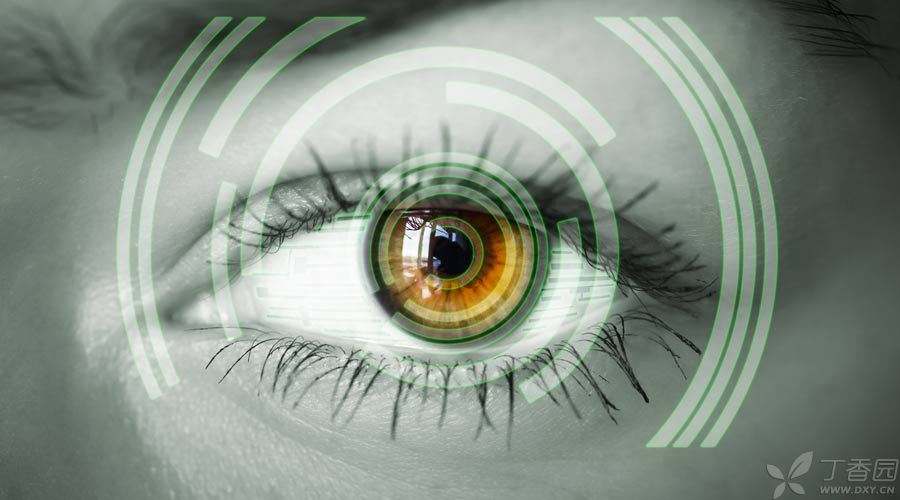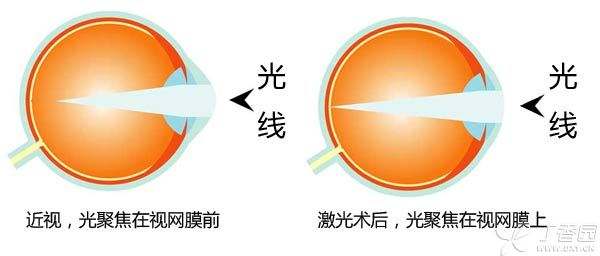
In the face of doctors with glasses, what you want to ask most is [doctor, why don’t you do the operation yourself].
Like most of my peers, the answer is simple: I don’t hate glasses and I’m used to them. It was not until a little guy around me showed full interest in my glasses, made a sneak attack from time to time, or accidentally bumped into my glasses while playing crazy with her that I began to realize the hidden dangers and inconvenience of wearing glasses.
In this way, I met the primary condition of laser correction surgery for myopia: the need to remove the mirror.
For those who need to remove mirrors, the next questions to be understood are: How does laser surgery correct myopia? Am I suitable for this kind of operation? Is there any adverse effect? If so, can I accept it?

Can what be eligible for surgery?
In addition to the reasonable desire or need to remove the lens, some conditions must be met before the operation can be performed. In most cases, laser correction surgery for myopia is a selective operation, and whether the operation can be performed is not absolute. Each individual needs to be comprehensively measured in combination with his own situation, including age, occupation, habits, etc.
Let’s illustrate it through several cases:
Case 1: A 17-year-old high school student, with a myopia of 400 degrees, is ready to enlist in the army.
Laser surgery to correct myopia requires an age of over 18 years old, because under normal circumstances, eyeball development has not completely stopped before 18 years old, and the degree is often unstable. Once the degree increases, glasses may need to be worn again.
After explaining the situation, the student and his family believed that enlistment was an important plan in his life, and it was acceptable even if he needed to wear glasses again in the future.
We operated on him and suggested that he should pay attention to his eye habits and still obtain stable and clear vision.
Case 2 Graduate student, myopia 1 250 degrees, corneal thickness moderate, want to take an examination of civil servants
Laser surgery can correct myopia of no more than 1,200 degrees, Generally, the correction effect of more than 1,000 degrees is not as good as that of medium and low myopia. According to the corneal thickness and myopia degree of the patient, If laser surgery is selected, there must be [residual degree]. This means that she must wear glasses after surgery and face the risk of poor visual quality after surgery. We suggest that she accept [refractive lens surgery] which is more suitable for high myopia.
However, after communicating with her, she said that the examination of civil servants was her deliberate career choice, so she made a lot of efforts. Physical examination only requires naked eye vision of 0.4 or more, not 1.0. She is willing to wear low-degree glasses and is willing to bear possible risks. She very much hopes to do laser surgery.
We carefully designed the operation plan, simulated the vision that still had a degree after the operation, but could meet the requirements of physical examination. Finally, we performed laser surgery for her. Although we did not achieve the goal of [taking off the lens], we brought new hope to her life.
Case 3 Driver, myopia 500 degrees, pupil in dark environment is too large, 8 mm, often need to drive at night, feel wearing glasses driving inconvenient and unsafe
Since it is difficult to avoid optical side effects such as vision loss and glare at night after laser surgery, it is not a problem for most people and can be adapted after a period of time, but the symptoms of people with large pupils may be very obvious.
In addition, this patient is also a driver and often needs to drive at night. His possible visual discomfort and potential safety hazards are much greater than wearing glasses. Therefore, we do not recommend him to undergo surgery. Wearing a suitable pair of lenses is a better and safer choice.
Case 4 University teacher, myopia 700 degrees, presbyopia 150 degrees, need two pairs of glasses to wear in class, very troublesome
Laser surgery is not the patent of young people, For middle-aged people facing myopia and presbyopia, laser surgery is also a good choice. Different from young people, the postoperative effect is not to pursue both eyes to see far clearly, but through appropriate surgical design, to achieve a state of seeing far at one eye and seeing near at the other eye, so that glasses are not needed to see far and near.
After the operation, the teacher finally got rid of the embarrassment of needing two pairs of glasses in class after a period of adaptation.
Case 5 Ophthalmologist, myopia 300 degrees, need to carry out microscope operation, recently feel inconvenient to wear glasses
This ophthalmologist is me, I need to watch computers and work under microscopes for a long time in my work. I also like reading books and browsing web pages in my leisure time. I have mild asthenopia and dry eye. Before the operation, I also received detailed eye examination, predicted and evaluated the short-term discomfort that may occur after the operation, such as dry eye, and the countermeasures. I relaxed and calmly cooperated with the surgeon to complete the operation.
Not only did I get clear vision after the operation, but also after using artificial tears for two months, asthenopia and dry eye were relieved. Thanks to the little fellow’s carelessness, I brought surprises and changes to my life.

How does laser surgery correct myopia?
The eyeball is like a sophisticated and sophisticated camera, with the cornea at the front end as the lens. Myopia is usually characterized by the eyeball being too long, parallel light entering the eyeball and imaging in front of the negative, that is, the retina, which blurs the image on the negative.
From excimer laser in the 1990s to femtosecond laser in recent years, the lens of cornea can be thinned and flattened like [shadowless hand]. The flat cornea makes the refraction angle of light smaller and makes the image clearly imaged in retina. Astigmatism and hyperopia can also be corrected by similar principles.
Can what people perform laser surgery?
If the following conditions are met, laser vision correction surgery may be considered:
Reasonable, want to pick or need to pick
Subjective wishes: mainly due to appearance considerations, sports needs, do not accept frames or contact lenses, etc. Passive needs: including the need to study or apply for a job, as well as the large difference in diopter between eyes and other situations that are not suitable for wearing glasses.
The age is between 18 and 55 years old.
The refractive power is relatively stable for more than 2 years (the annual change does not exceed 50 degrees)
Preoperative ophthalmic examination for further judgment
Those who meet the basic requirements in indications can undergo further detailed examination, including diopter, corneal thickness, corneal morphology, pupil size, intraocular pressure, fundus, etc. According to the examination results, judge whether it is suitable for surgery and which surgical method is suitable.
The degree of myopia that can be corrected by surgery
At present, laser corneal refractive surgery can correct the diopter range within 1 200 degrees for myopia, 600 degrees for hyperopia and 600 degrees for astigmatism. Moreover, the corneal thickness is required to be appropriate, and keratoconus and other corneal diseases should be excluded.
Can’t what do laser surgery?
If you have the following problems, you cannot accept laser vision correction surgery:
- There are active eye inflammation, autoimmune diseases such as systemic lupus erythematosus and other severe dry eye women during pregnancy and lactation, etc.
Adverse effects after the operation?
Security-First Consideration
Laser correction surgery for myopia has gone through more than 20 years since its birth, and its safety and effectiveness have been widely recognized, bringing good vision to tens of millions of myopia patients. With the innovation and progress of technology, the current surgery is faster, more accurate, less invasive, safer and more comfortable.
The incidence of serious complications affecting vision, such as corneal dilatation and corneal infection, is extremely low. It can be avoided by strictly screening patients who meet the surgical conditions, selecting appropriate surgical schemes, paying attention to intraoperative operation specifications and postoperative nursing, and the cooperation of patients.
Therefore, everyone is encouraged to perform laser surgery in regular professional medical institutions to ensure safety.
Legend’s [Rebound]-Need Correct Understanding
Postoperative vision [rebound] is the most common doubt.
When laser cuts the cornea, the cornea will proliferate. If the cutting surface proliferates evenly, it will not cause degree change. If the central proliferation is more than the peripheral proliferation, there will be slight regression, i.e. [rebound]. With the development of surgical technology, the optimization of surgical design and the perfection of postoperative medication, regression can be predicted and controlled.
The possibility and degree of regression are related to the degree of myopia. Moderate and low myopia generally does not have regression. Although the possibility of regression is high for high myopia, it can generally be controlled at about 5% of the original degree.
For many years of vision decline after surgery, it is often not due to [rebound], but due to the deepening of myopia itself or other reasons, which requires eye examination in the hospital. Because the surgery changes only the cornea, and the complete refractive system of the eye has many other structures involved.
Problems that really need to be predicted
Compared with serious complications with low incidence rate, what really needs to be correctly predicted are some seemingly small adverse reactions, such as dry eye, nighttime vision loss, glare, halo, etc., which can be gradually adapted and recovered for most people over a period of time.
If you don’t know that these are all possible situations after laser surgery, it will cause unnecessary anxiety and worry.
However, for some special patients, these adverse reactions are not easy to recover, and it is necessary to fully communicate with doctors and carefully decide whether to operate.
Editor: Fei Fei
Author: Xu Ye
This article is exclusively authorized to be used by Clove Garden and refuses any other form of reprinting.
